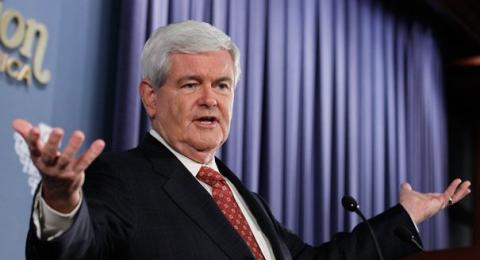A possible key component of a conservative comeback in 2010 and 2012, former House Speaker Newt Gingrich seems to be singing a tune that California conservative candidates might consider (if they are to effectively reach out to the state’s independent voters).
Besides talking national politics to a group of reporters and bloggers at the weekly Heritage Foundation’s Blogger’s Briefing (April 13), the former speaker placed a heavy emphasis on state politics since the presidential election is still years away.
One of the issues he tackled is the federal government’s unloading of burdensomeunfunded federal mandates on the individual states, something that the Golden State knows all too well. Gingrich said that he would even be “willing to consider” proposing a constitutional amendment banning unfunded congressional mandates on the states.
He also stated that he would push state legislatures to create a federal cost analysis for their respective states. “If every governor and every state legislature will create a national federal cost analysis , that would be an enormously helpful way of highlighting it,” he said, presumably referring to more fiscal responsibility and the destructive onslaught of unfunded federal mandates.
Reflecting on the 1942 Democratically-controlled Congress that created what he termed “an anti-appropriations committee,” Gingrich claimed that “a substantial number of New Deal agencies were abolished by the actions of that committee.”
Fast forwarding to today, Gingrich seems to be advocating a more limited government kind of conservatism based on the 1942 prototype, a brand definitely breaking with the "compassionate conservatism" of the George W. Bush administration that didn’t shrink government.Independents might find this more limited government model appealing (given that it actually accomplishes the peace of mind that many citizens are seeking). In the case of California, the chief concerns would be jobs and the economy.
Furthermore, if the Gingrich proposal of a constitutional mandate banning unfunded federal mandates ever materializes in Congress, this too might woo independents to vote for conservatives in the upcoming elections. The caveat to this, of course, is if conservatives actually offer persuasive arguments offering tangible relief to states like California.
This persuasive factor is a great segway to conservative rhetoric in contemporary politics, portrayed as divisive. The divisiveness factor is definitely something that conservatives ought to consider, Gingrich implied.
While some might see Gingrich being divisive himself in his calling President Obama the most radical president this country has seen, he did suggest in the briefing that conservatives need to be a party of “yes,” proposing actual solutions to the current big government agenda.
“You can’t govern by saying no,” he said. “Offer a dramatically better set of solutions principled based on conservatism...but solutions...not just ideologies. And all of a sudden people look up and you have an argument.”
Top priorities he said Republicans should focus on in the coming months include jobs, taxes, and cutting government spending. As of right now, conservatives need to focus strategically on state level races, including the gubernatorial races like California in the coming months.
Short of offering an official endorsement of her, Gingrich labeled gubernatorial candidate Meg Whitman as being in a class of “really good candidates” in 2010.
